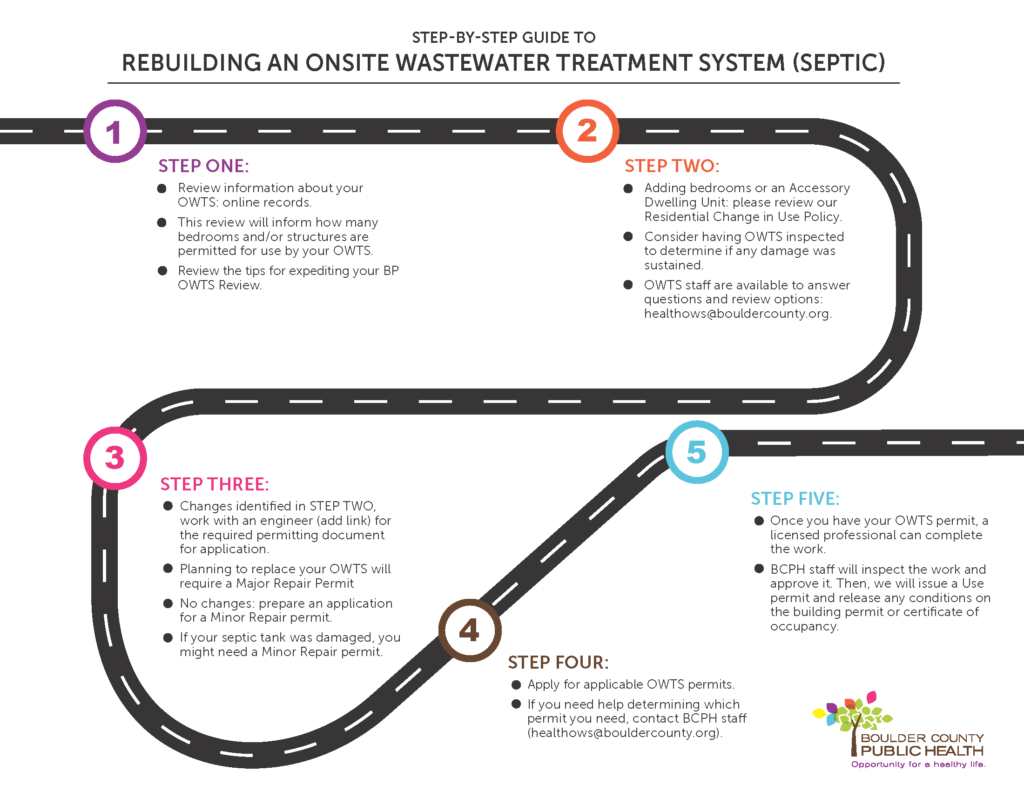Onsite Wastewater Treatment Systems (Septic) After a Fire
If your tank and/or soil treatment area (leach field) were not damaged, it could be reused if the property is redeveloped. Sewer lines should be capped until ready to be reconnected. Consider having the tank pumped as part of your property clean-up.
If the property is not redeveloped, the septic tank should be properly abandoned. Have the tank pumped and then filled with sand or gravel, remove it, crush it, and leave it in place.
When returning to your property, inspect the area around your septic system for signs of damage from fire and traffic from fire-fighting operations. If you feel your septic system may have been damaged, discontinue use until a licensed professional has inspected the system. The system may have been impacted if:
- Plastic piping above ground has melted
- Evidence of vehicle traffic in the area of the system
- The raised system was in the direct line of fire (i.e., the grass on top is scorched)
- There is damage in the area where the pipes enter the home
If you would like to have your system inspected, you will need to hire a licensed, private contractor. Our website has a list of these businesses; search for “Inspectors” in our Licensed Professional List.
*Please note that Boulder County Public Health (BCPH) does not require that your OWTS be inspected post-wildfire. An inspection may only be required when the property title is transferred or the existing OWTS is used for non-residential purposes (e.g., adding bedrooms).
Repairs or Replacement of OWTS

Download a step-by-step guide to rebuilding an onsite water treatment system (septic)
In some cases, repair or replacement of the OWTS may be required. If your system was damaged by fire or clean-up work, you are planning to increase the number of bedrooms in your rebuilt home, or planning to add an ADU or new use to the property, a new OWTS may be required. The following steps outline the OWTS permitting process as you navigate rebuilding.
- The first step is to hire an OWTS engineer familiar with Boulder County regulations. Your architect or builder may have a recommendation, or you can refer to our list of licensed professionals and search for “Engineer.”
- If you replace a septic tank and no changes to use or bedroom counts will occur, you may not need an OWTS engineer. You can contact a licensed installer to replace your septic tank, and they can help you with what will be required. You must apply for a minor repair permit from Boulder County Public Health.
- Once you have your OWTS engineer onboard and plans for rebuilding (including bedrooms, auxiliary structures, and any additional, non-residential uses identified), the OWTS engineer can review the existing OWTS capacity and current condition of the system. From there, they will determine if updates or replacements are necessary.
- Learn about OWTS sizing for accessory dwelling units and Residential Change in Use Policy.
- Once the OWTS engineer has completed the OWTS design, you can apply for an OWTS permit with Boulder County Public Health.
- Permit and Fee Schedule
- Application – you can apply via mail or online
- We recommend applying for your OWTS permit simultaneously or before applying for your building permit. We may hold off on issuing a building permit until we ensure the OWTS design can be approved.
- Once we receive the application, we will conduct a site inspection, review the plan, and issue an OWTS construction permit. Once this permit is issued, any BCPH holds on the BP will be released. We will require the OWTS to receive final approval from BCPH before a CO is issued by Community Planning and Permitting.
- Once a licensed installer has installed the OWTS, they will contact BCPH to conduct a final inspection.
- Once the installation is approved, we will issue a Use Permit (there is no fee for this) and release the hold on the CO for the structures.
If you have questions about your specific needs, please contact us at HealthOWS@bouldercounty.gov or at 303-441-1564 and leave a message including your address. We have staff on call Monday through Friday from 8 to 4:30.
Resources for Septic System Owners
BCPH has compiled helpful information to provide guidance and answer questions about the Marshall Fire impacts on septic tanks and wastewater:
- SepticSmart Program
- SepticSmart: Check Septic Records
- SepticSmart Licensed Professionals and Resources
- Wells and Wastewater After a Fire – general guidance
- Guidance for Property Owners Impacted by Wildfires with Homes Served by Wells and Onsite Wastewater Treatment Systems – Purdue University
Learn More
Residents who have questions or concerns about the impacts of the Marshall Fire and the subsequent recovery effort can get more information here:
- Email marshallfirehealthinfo@bouldercounty.gov
- Call 303-441-1564
- Marshall Fire General Information
- City of Louisville
- Town of Superior
As new information develops, we will continue to add resources to this page.



